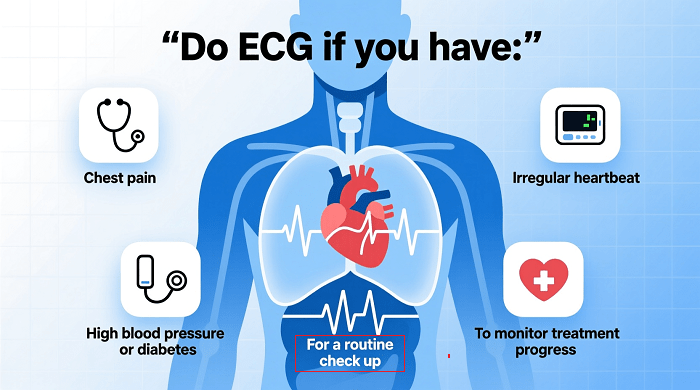ECG: Top 5 Reasons Your Doctor May Recommend It
Last Updated on 02/09/2026 by Helal Medical
Introduction
An electrocardiogram (ECG) is one of the most common and valuable tests in modern medicine. It’s quick, painless, and provides your doctor with essential information about how your heart is functioning.
Many patients are surprised when we (at Helal Medical) suggest an ECG, even if they feel fine. But in reality, this test helps detect heart problems before they become serious.
Here are the top 5 reasons your doctor will recommend this test.
1. Chest Pain or Pressure
One of the main reasons for doing an ECG is chest pain. This could be caused by:
- Angina (reduced blood flow to the heart)
- Heart attack (blocked artery)
- Other heart rhythm issues
It can help your doctor quickly determine if the pain is related to your heart or caused by something else like muscle strain or acid reflux.
👉 Learn more: American Heart Association – Chest Pain and ECG.
2. Irregular Heartbeat or Palpitations
If you feel your heart skipping beats or beating too fast, it is recommended to check for:
- Atrial fibrillation
- Supraventricular tachycardia (SVT)
- Ventricular arrhythmia
These irregular rhythms are not always dangerous, but need proper evaluation—especially if you feel dizzy or faint.
3. High Blood Pressure or Diabetes
Both hypertension and diabetes increase your risk for heart disease. Even without symptoms, your doctor recommends an ECG to detect:
- Early signs of heart enlargement
- Silent (unnoticed) heart attacks
- Electrical conduction changes due to long-term high blood pressure
Doing it regularly helps monitor your heart’s condition over time.
👉 See related info at NHS – Overview.
4. Routine Check-up or Pre-Employment Medical
Many clinics in the Philippines, including Helal Medical Diagnostic, recommend an ECG for routine checkups.
This test provides a baseline record of your heart’s health and helps detect hidden abnormalities that might not show symptoms yet.
Even if you feel healthy, this procedure can be reassuring and useful for future comparisons.
5. Monitoring After Heart Treatment or Surgery
If you’ve had a heart attack, angioplasty, or take cardiac medications, your doctor may use ECGs. They will monitor your progress and the effects of your treatment.
An ECG shows whether:
- Your medications are working properly
- Your pacemaker (if any) is functioning
- The heart rhythm has returned to normal after treatment
👉 More at Mayo Clinic – Overview.
How Often Should You Have an ECG?
It is not needed for healthy adults, unless symptoms develop. Patients with high blood pressure, diabetes, or a history of heart issues are advised differently. Doctors may suggest one every 6–12 months as part of a cardiac checkup.
Summary
An ECG is a powerful, simple, and safe tool that gives doctors critical insight into your heart’s rhythm and health.
Your doctor recommends an ECG if you have:
- Chest pain
- Irregular heartbeat
- High blood pressure or diabetes
- For a routine checkup
- To check treatment progress
Early diagnosis and monitoring can save lives. If you experience chest discomfort or unusual heartbeats, don’t ignore them—schedule an ECG at your nearest diagnostic clinic.
✅ Word count: ~950
✅ External Links (3 included):
✅ Suggested Internal Link (for your website):
- “Schedule your ECG test, chat at Helal Medical Diagnostic in Malate, Manila.”
Discover more from Helal Medical Manila
Subscribe to get the latest posts sent to your email.



